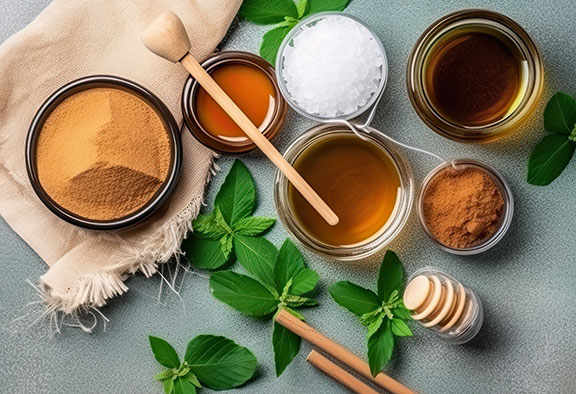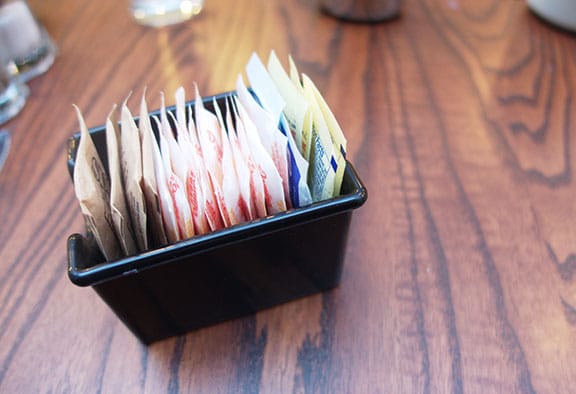
Life with diabetes might not always be sweet—but your diet can be. If you’ve just recently received a diabetes diagnosis, that might come as a surprise; after all, people living with this disease are encouraged to keep their refined sugar intake to a minimum. But there are other ways to add a touch of sweetness to foods and beverages while staying healthy.
Are you looking for the best sweetener for diabetes or wondering which artificial sweeteners raise blood sugar? Here’s the complete Advanced Diabetes Supply guide to what’s better for diabetes: natural sugar or artificial sweeteners.
How Do Sugars and Sweeteners Impact Diabetes?
If you have type 1 diabetes, your immune system has inaccurately identified the cells responsible for insulin production as a threat and has responded by attacking these cells. Meanwhile, type 2 diabetes occurs when your insulin cannot properly manage glucose from your food and beverage intake.
In both cases, consuming excessive amounts of sugar can make diabetes management harder. Since people with diabetes either don’t have enough insulin or can’t use it correctly, their bodies have trouble taking blood glucose and sending it to individual cells. Meaning blood sugar levels can stay high for an extended period, potentially leading to nerve damage, heart disease, and other complications associated with diabetes.
Most artificial sweeteners are different—these sweeteners do not directly impact people’s blood sugar levels. Because of this, most artificial sweeteners are considered “free foods” (foods with no more than 5 grams of carbs and fewer than 20 calories, which aren’t listed as calories or carbohydrates on a diabetes exchange). Of course, there are other factors to consider when eating foods prepared with artificial sweeteners, but we’ll get into that later.
Understanding the Different Types of Sweeteners
To know the best sweetener for individuals living with diabetes, you need a thorough understanding of your options. Are you unsure what sweeteners can be used? Take a look at these sweetener categories:
Natural Sugar
As the name suggests, natural sugars are sugars found in whole foods like fruits, vegetables, dairy and grains. Some well-known natural sugars include glucose, lactose, sucrose, and fructose.

Refined Sugar
If you’re wondering “which sweeteners spike insulin?,” know that refined sugar is a major offender in this regard. Also known as “processed sugar,” refined sugar is sugar taken from foods like sugar beets or sugar cane and added to other foods. It’s often found in baked goods, ice cream, and other “junk foods.”
Artificial Sweeteners
Finally, artificial sweeteners are products that deliver the flavor of sugar without the associated carbohydrates and calories. Some leading artificial sweetener brands include Sweet’N Low (saccharin), NutraSweet (aspartame), and Splenda (sucralose).
The Effects of Natural and Added Sugars for People Living with Diabetes
Obviously, natural sugars are still sugars—and they can negatively impact people with diabetes because of that. However, these sugars often come with antioxidants, fiber, and other nutrients, which can help to mitigate their drawbacks and deliver additional health benefits.
On the other hand, refined sugars can be absorbed quickly by the human body, making them a common cause of blood sugar spikes in people with diabetes. While a balanced diabetes diet should contain a reasonable amount of carbs, most—if not all—of these carbs should come from natural sugars.
Choosing the Best Sweeteners for Diabetics
As you know, refined sugars can be dangerous for people with diabetes. Thus, people living with this disease should choose between artificial and natural sweeteners when they’re looking to add a sweet flavor to foods and drinks.
While you’ve already had a chance to learn about artificial sweeteners, you should know that natural sweeteners can deliver many of the same benefits. Some of the leading natural sugar alternatives include:
- Fruit-based sweeteners. Fruit is a prominent source of natural sugar, and many natural sweetener options rely on that. Monk fruit extract is entirely free of carbohydrates and calories, while date sugar contains two-thirds of the calories found in traditional sugar.
- Tagatose. This is a natural sweetener derived from the lactose occurring in dairy products. Though research into its health effects is ongoing, it may assist in lowering people’s blood sugar levels.
- Stevia. Believe it or not, this technically isn’t an artificial sweetener—instead, it comes from the plant of the same name and is a natural sweetener. On its own, stevia does not raise blood sugar levels; however, some stevia blends include other sweeteners, which may cause your blood sugar to rise.
Tips for Incorporating Sweeteners Into a Diabetic Diet
Sweeteners can be a safe part of your diabetes diet—if you’re smart about how and when you consume these products, anyway. When thinking about sugar alternatives be sure to:
- Not rely too heavily on artificial sweeteners. The jury’s still out on the exact impact artificial sweeteners have on glucose and insulin levels, as studies on the subject have had mixed results. Additionally, while artificial sweeteners aren’t a source of carbs, the same isn’t always true for the foods these sweeteners are found in.
- Not worry too much about artificial sweeteners, either. People have been anxious about artificial sweeteners for decades, largely because of studies in the ‘70s claiming saccharin was linked to bladder cancer in lab rats. But today, the artificial sweeteners approved for sale in the US are considered safe to use.
- Keep an eye out for sugar alcohols. Foods advertised as being “sugar-free” might still contain sugar alcohols. These sweeteners don’t include sugar (or alcohol, for that matter), but they are still considered carbohydrates. Also, your body can’t fully digest sugar alcohols, which can lead to some unpleasant GI symptoms.
- Consume refined sugar in moderation. While refined sugars shouldn’t be a fixture in your diabetes diet, small amounts of foods that contain this type of sugar are alright in moderation. Just make it a point to control your portion sizes and eat a nutritious diet otherwise.
- Stay cautious when it comes to sugary beverages. Soda, fruit juices, and other sweet drinks contain high amounts of carbohydrates—and those carbs act faster than those found in food items. However, that property makes these beverages excellent at helping people with diabetes deal with hypoglycemia or low blood sugar.
Frequently Asked Questions About Sweeteners and Diabetes
Do Artificial Sweeteners Raise Blood Sugar?
Artificial sweeteners are also called sugar substitutes, low-calorie sweeteners or nonnutritive sweeteners. They offer the sweetness of sugar without the calories. Artificial sweeteners are many times sweeter than sugar. Because of this, it takes only a small amount of artificial sweeteners to sweeten foods. This is why foods made with artificial sweeteners may have fewer calories than those made with sugar.
Some studies have found that substituting sugar-sweetened food and beverages with those that have been artificially sweetened may not be as beneficial as once thought. This may be especially true when artificial sweeteners are consumed in large amounts. But more research is needed.
Are Sugar Alcohols Bad?
People with diabetes can metabolize sugar alcohols without insulin and partially digest these sweeteners in the intestine. Types include mannitol, sorbitol and xylitol. Sugar alcohols can increase your blood sugar level. These products also contain about half of the calories found in “regular” sugar. But they still count as carbohydrates—and they can trigger side effects like abdominal pain, gas, bloating and diarrhea.
What is a Good Sugar Substitute?
Instead of adding refined sugar to foods and beverages, people with diabetes should use moderate amounts of the artificial and natural sweeteners listed in this article. As always, your dietitian or diabetes health-care team can help you decide if including any type of sugar substitutes in your eating plan is the best choice for you.
Are Natural Sugars Bad?
While people with diabetes should take care not to consume excessive amounts of natural sugar, these sweeteners can impact blood glucose less than granulated sugar. Some natural sugar products come with additional health benefits, as well.
Where Can I Find Diabetes Supplies Online?
The best source of continuous glucose monitors, diabetes testing supplies, and other supplies for diabetes management is ADS. We offer both exceptional customer service and the name-brand products you trust—get started by placing your order today!
